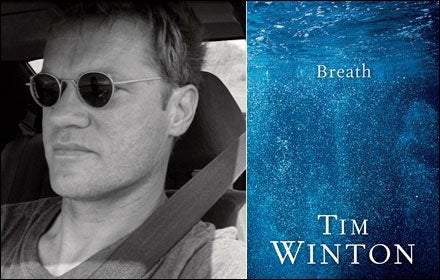THAT MOST OF US read more in summer, when we’re supposed to be out playing, must have something to do with all that lightand all that hammock time. We like our vacation books like our flings: hot and eventful.
In Breath (Farrar, Straus and Giroux, $23), Australian novelist and two-time Booker Prize finalist Tim Winton has penned a bildungsroman worthy of your beach stash. The two-fisted tale is told by Brucie Pike, a 15-year-old growing up on Australia’s wild west coast who comes to idolize a mysterious big-wave artist called Sando. “I watched the yellow blur of his board through the glassy back of the wave,” the boy says. “I saw the flash of his hands, his arms cast up. He was dancing.” When Brucie learns to surfand falls for Sando’s girlfriendthe waters turn rough. Winton’s lyrical prose gets surf culture right and establishes him as the Aussie Kem Nunn.
California crime writer Don Winslow is more like a wave-riding, cheesy Elmore Leonard. His clichéd but addictive surf noir, The Dawn Patrol (Knopf, $24), finds board-toting private investigator Boone Daniels caught behind an unsolved abduction case with Petra Hall, a beautiful, naughty lawyer who causes him to miss SoCal’s biggest swellsbut not his favorite strip club. Throughout the story, fish tacos show up like fillets of Ahab’s whale. “Everything tastes better on a tortilla,” writes Winslow.
If you’ve ever entertained a suspect e-mail offer from a Nigerian businessman who wants to buy your pickup truck (and I admit, I have), you’ll appreciate My Mercedes Is Not For Sale (Broadway, $13), by Dutch journalist Jeroen van Bergeijk. Van Bergeijk bought a hell-for-stout ’88 diesel Benz 190D hoping to flip it for profit in northwest Africa. In 2004 he drove the rust bucket from Holland to Burkina Faso via Morocco, encountering countless breakdowns and a military coup along the way. “There are two ways to drive over a washboard piste,” he writes during his Sahara crossing. “Either very, very slowly . . . or so fast the car’s wheels just barely touch the top of the ridges.”
Traveling in higher style (via subway systems with flat-screen TVs, for example) can’t shield J. Maarten Troost from culture shock in Lost on Planet China (Broadway, $23), a chronicle of his four-month trip through “the world’s most mystifying nation.” “Just when I thought I couldn’t be any more weirded out by China,” he writes, “I was”sometime between eating at a Beijing restaurant that offered “cattle penis with garlic” and visiting Guangzhou, where the brown air is “apocalyptic.” Troost’s humor is reminiscent of a coach-class P.J. O’Rourke, and ranges from laugh-out-loud to tiresome. But as a guide to interpreting China’s people and culture, he’s a lot more entertaining than a Lonely Planet.
Rick Bass (The Lives of Rocks) typically finds adventure in his own northwest-Montana backyard. But in his new memoir, Why I Came West (Houghton Mifflin, $24), the petroleum geologist turned eco-activist shows signs of fatigue, lamenting both his growing apathy toward fiction writing and the losing battle to save the planet. “As a geologist, then, and a discoverer of our second-worst addiction (our worst being apathy), how can I possibly dare to argue for the protection of our last American wilderness?” he writes. “How can I possibly not?” Largely comprising past magazine pieces, it’s classic Bass. But even writers, it seems, could use a summer break.


